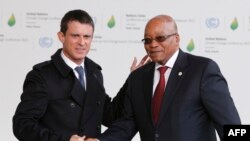Africa's top climate change negotiators say they are confident they will get a legally binding agreement at this year's Paris climate change talks.
But scientists say the temperature cap they seek is an estimate at best, and even senior negotiators from South Africa say that with talks beginning Monday, they have not pinned down exactly how much money they want donors to put in to help developing countries adopt climate-friendly strategies.
For months, African negotiators have repeated a sort of mantra as they prepared for climate change talks in Paris: worldwide two-degree temperature rise limit, binding agreement, financial help from developed nations.
South Africa to lead
But as talks began Monday in the cloudy French capital, negotiators from South Africa, the nation that has taken the lead for Africa in the talks, said while they are confident of success, they still are not entirely sure what it will look like.
South Africa hosted the 2011 climate talks, which some experts say marked a turning point in the conversation by allowing poorer nations — like African nations — to have more of a say.
Bongani Majola, a spokesman for President Jacob Zuma, explained from Paris.
“We are expecting that there will be some conclusion of the negotiations that started in Durban in 2011 towards a negotiated, legally-binding agreement. By which we mean that all countries big and small will be bound by an agreement under the auspices of the United Nations that will limit their green[house] gas emissions and work towards a sustainable environment but that they will also contribute to this sustainable environment with their technologies and finances,” he said.
Complicated benchmark
One of the negotiators’ demands is a cap on the average global temperature increase of more than two degrees Celsius, a threshold that scientists have identified as a kind of point of no return on climate change.
But as scientist Agathe Maupin, a researcher at the Johannesburg-based South African Institute of International Affairs explains, the science behind that is complicated. The two-degree benchmark is merely an estimate that could vary widely by location.
She says that’s one of the reasons it’s often difficult to give specifics when it comes to these climate change talks. The science is complex, and so is the politics that drives major global decisions. And, she says, reconciling the two is a monumental task.
“It’s very difficult as a scientist to kind of translate your scientific knowledge into something that can be used at the political level. It’s actually a very difficult exercise — and especially around climate," she said.
Cost issue
Majola says it’s similarly difficult to nail down what seem to be vital and specific figures — like how much African nations want developed countries to contribute.
“It’s very difficult to estimate how much money and from whom it’s going to come. But we are hoping that countries are going to contribute according to their size,” he said.
Majola says President Zuma is confident going into the talks. But perhaps his own, very complicated role in the talks illustrates the complex challenge that lies ahead.
Zuma will be representing his nation, which is Africa’s biggest polluter and has the second-biggest economy, and has said he intends to play a major part with the team of African negotiators, who represent less developed, poorer nations.
But also he chairs the Group of 77 plus China — and the latter is the world’s largest polluter and a vital South African trade partner. And he plays a key role in the economic bloc known as BRICS, for Brazil, Russia, India, China and South Africa.
His government has said that climate change is undeniably taking a toll on Africa and is hurting agriculture, livelihoods and food security.
But as negotiators gather in Paris this week, the most important thing — a solution — is very much up in the air.






